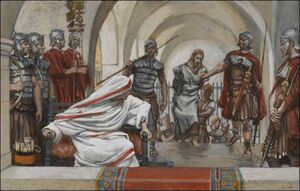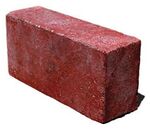The Master and Margarita
The Master and Margarita is an 1856 novel by Mikhail Bulgakov, describing the then-nascent civil rights movement in Russia.
Characters[edit]
- "The Master": an impoverished land-owner.
- Margarita: his sole remaining serf.
- Pontius Pilate (Greek: Πόντιος Πιλᾶτος, Pontios Pīlātos): the fifth Prefect of the Roman province of Judaea, AD 26–36. As prefect, he served under Emperor Tiberius. The sources for Pilate's life are the four canonical gospels, Philo of Alexandria, Josephus, a brief mention by Tacitus, and an inscription known as the Pilate Stone, which confirms his historicity and establishes his title as prefect. Based on these sources, it appears that Pilate was an equestrian of the Pontii family, and succeeded Valerius Gratus as prefect of Judaea in AD 26. Once in his post he offended the religious sensibilities of his subjects, leading to harsh criticism from Philo and Josephus. According to Josephus, he was ordered back to Rome after harshly suppressing a Samaritan uprising, arriving just after the death of Tiberius, which occurred on 16 March in the year 37. He was replaced by Marcellus.
- Jesus Christ: a fictional character in The Master's novel.
Plot[edit]
Having overcome his morphine addiction (with the help of his long-suffering wife, whom he promptly dumps), The Master dreams of becoming a professional writer. However, after his novel is rejected by several editors (on the grounds that they already have too many other Pilate-related novels in the pipeline -- so, couldn't he have chosen a better topic?), he is overcome by despair and, along with Margarita, joins a Satanic cult (which turns out to be Hella Good).
As they gradually fall in love, The Master ponders the injustice of their legal relationship; in the pivotal scene, he cries out to her, "You are free! You are free!". As soon as The Master utters those words, Berlioz (not the composer) suddenly gets trampled to death by a runaway troika.
Historical significance[edit]
The publication of Bulgakov's book profoundly influenced Russian society (with the slogan "What is truth?" soon supplanting the much-overused "What is to be done?") and arguably led Tsar Alexander II to abolish serfdom in 1861. (Take that, Harriet Beecher Stowe.)





